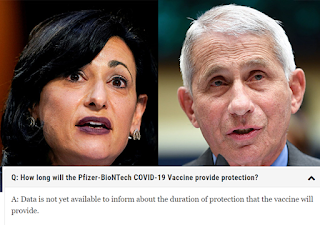Flying under the radar is an admission made by the FDA regarding the durability of the one COVID-19 vaccine – the Pfizer vaccine (under the name COMIRNATY) – that was officially “approved”: “data is not yet available to inform about the duration of protection that the vaccine will provide.”
This stands in contrast to CDC admissions, in support of their push for a booster shot, that “vaccine effectiveness against COVID-19 infections is decreasing over time.”
Anyway, what a statement in light of the history of the Pfizer vaccine - and the publicly available data.
For background, let’s review some history. The Pfizer vaccine’s IND (New Drug Application) was filed in April 2020, after which it was granted its Fast Track Designation in July 2020. On December 11, 2020, the FDA issued an Emergency Use Authorization (EUA) for the Pfizer vaccine for persons age 16 and up. The Pfizer vaccine (COMIRNATY) was “approved” by the FDA on August 23, 2021.
Since the summer of 2020, Pfizer has been studying its vaccine on tens of thousands of individuals. The reliability of these studies was diminished greatly in December 2020, when the Pfizer study participants were “unblinded” and offered the Pfizer vaccine if they initially received the placebo.
From the time of the Pfizer vaccine EUA until the FDA gave its “approval” of the Pfizer vaccine, hundreds of millions of Pfizer vaccines had been administered. As of September 26, 2021, approximately 223 million people had received the Pfizer vaccine.
And as we previously discussed, the FDA’s approval of COMIRNATY was suspicious for a number of reasons, including because the COMIRNATY fact sheet admits “The duration of protection against COVID-19 is currently unknown.”
We had doubts about the truthfulness of that statement back in August, noting that Pfizer was relying on data “through March 13, 2021.” We observed that the data was five months old, asked if the FDA was using outdated information to support its COMIRNATY approval, and noted that more recent evidence pointed to vaccine effectiveness diminishing over time.
On that point, with studies that have been ongoing since the summer of 2020, and hundreds of millions of vaccines being administered, and the CDC concessions of duration issues, how is it possible for the FDA to conclude “data is not yet available to inform about the duration of protection that the vaccine will provide”?
If it sounds like they’re hiding something – it’s because they are.
The CDC has issued a press release (attributable to CDC Director Dr. Rochelle Walensky, NIH Director Francis Collins, and Dr. Anthony Fauci, among others) “based on a thorough review of the evidence” that:
“We are prepared to offer booster shots [Pfizer and Moderna] for all Americans beginning the week of September 20 and starting 8 months after an individual’s second dose.”
This leads us to an important question:
If the data on the duration of the Pfizer vaccine is “not yet available,” then how can the CDC and Dr. Collins and Dr. Fauci recommend the Pfizer booster shot after 8 months?
While the CDC has provided some information on the topic, there is certainly more they aren’t telling us.










